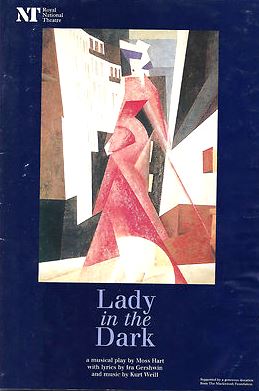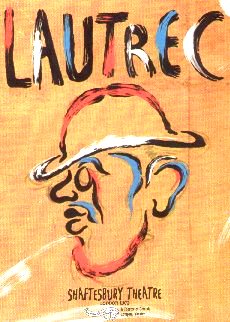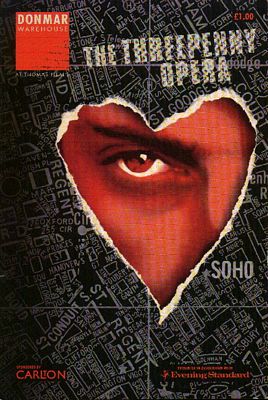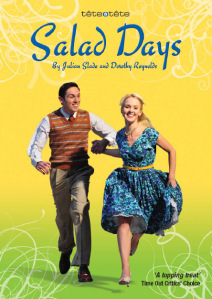Pas de biographie disponible.
Compositeur Musique additionelle Librettiste Parolier Metteur en scène Chorégraphe Producteur création Producteur version

Version 1
Lady in the dark (1997-03-National Theatre Lyttelton Theatre-London)
Type de série: RevivalThéâtre: National Theatre (Londres - Angleterre) Salle : Lyttelton TheatreDurée : 4 mois 3 semaines Nombre : 63 représentationsPremière Preview : Tuesday 11 March 1997Première : Tuesday 11 March 1997Dernière : Saturday 02 August 1997Mise en scène : Francesca Zambello • Chorégraphie : Queeny Sachs • Producteur : Avec : Maria Friedman (Liza Elliott), Paul Shelley (Kendall Nesbitt), Adrian Dunbar (Charley Johnson), Steven Edward Moore (Randy Curtis), James Dreyfus (Russell Paxton), Hugh Ross (Dr. Brooks), Ashleigh Sendin (Miss Foster), Summer Rognlie (Alison Dubois), Charlotte CornwallCommentaires : This was the first collaboration of Ira Gershwin following the death of his brother, and ran for 467 performances in New York in 1941. The leading role was played by Gertrude Lawrence, and the show made a star of newcomer Danny Kaye in the role of a camp photographer with a show-stopping patter number “Tchaikowsky”.
The musical is so constructed that all the numbers are sung during the dream sequences that Liza describes to her doctor. The only exception is the song “My Ship” which serves a special part of the plot: it is a half-remembered song from Liza’s childhood and because Charley is the only man who can complete the song for her, he wins Liza’s love.
55 years after its Broadway debut, this was its first London production, though it did have a production at Nottingham in 1981 with Celeste Holm. The critics found it fascinating and important, but felt it suffered by comparison with “Guys & Dolls” which was currently the opposition under the same National Theatre roofPresse : "...Surprisingly, Maria Friedman turns out to be far better at playing Liza, the cool and often collected editress of Allure Magazine – with her talent for cut and thrust - than as the suffering girl on the verge of a nervous breakdown... Miss Friedman in in sweet voice and artfully holds the balance between drama and music, which Lady in the Dark so cleverly celebrates. It is a rousing occasion." Nicholas de Jongh, The London Evening Standard (12 March 1997)
"...[The Lady in the Dark's] saving grace is Weill's score, which allies the emotional plangency of Berlin period to Broadway idioms...The other good reason for seeing the show, as with Sondheim's Passion, is Maria Friedman's stellar performance. She actually persuades you that inside the professionally masterful but emotionally dithering Liza lurks a badly bruised spirit. She sings the big numbers with a direct lyric simplicity and she allows her Guiletta Massina-like clown instinct to emerge in a circus sequence where she cavorts with the pawkiness of a wild-eyed child. The evening belongs unequivocally to her..." Michael Billington, The Guardian (12 March 1997)
"...By all accounts Gertrude Lawrence was magic as the fashion-mag editor...Maria Friedman, who is fronting what the National claims is the musical's belated British premiere, is not quite so charismatic, but once again she proves herself splendidly versatile, resourceful performer... The supporting cast is fine and Friedman more than fine. When she exits from a big-top fantasy episode to launch first into Weill's celebration of vamps, The Saga of Jenny, and then into his splendedly robust love song. My Ship - well, she had the first-night audience wishing the palm of her hand was larger, so we could spend more time in it." Benedict Nightingale, The Times (12 March 1997)
"...The woman having the crack-up is Liza Elliot, the hotshot editor of a leading fashion magazine. In this role, Maria Friedman is badly miscast. She's too sweet, concessive-looking and breathy to project the drive, authority and magnetism that have got this business-suited woman to the top. It's true that in Sondheim's Passion, Friedman conveyed power, but it was the potency of an implacably loving masochism. Here you need a stronger sense of the enamelled armour Liza has built around herself. For if the charcter in Passion was straightforwardly ugly, in Lady in the Dark, the heroine is found to be compensating for the fact that she was thought unattractive to her parents as a child. It's a discovery that allows the show to employ psychoanalysis to endorse traditional roles. Liza's success has nothing to do with trying to compete on equal terms with men, we deduce from the shrink, rather it's the refusal to risk being hurt by competeting with other women. So of the three complete ciphers who want to marry her, she ends up choosing the one who also wants her job..." Paul Taylor, The Independent (13 March 1997)
"...Despite an excellent cast, Lady in the Dark seems like an exercise in theatrical archaeology... The show isn't helped by the fact that Freudian psychoanalysis, for which Lady in the Dark often seems one long advertisement, is increasingly discredited... What scuppers Lady in the Dark, though, is the ;ack of warmth and audience involvement. Maria Friedman is one of our finest musical-theatre talents, but, although she communicated moments of mental distress as Liza, she never comes close to moving you..." Charles Spencer, The Daily Telegraph (13 March 1997)

Version 2
Lautrec (2000-04-Shaftesbury Theatre-London)
Type de série: OriginalThéâtre: Shaftesbury Theatre (Londres - Angleterre)
Durée : 2 mois 1 semaine Nombre : Première Preview : Monday 27 March 2000Première : Thursday 06 April 2000Dernière : Saturday 17 June 2000Mise en scène : Rob Bettinson • Chorégraphie : Queeny Sachs • Producteur : Avec : Sevan Stephan (Henri Toulouse-Lautrec), Hannah Waddingham (Suzanne Valadon), Jill Martin (Adele), Nigel Williams (Alphonse), Martin Fisher (Gabriel), Peter Gallagher (Aristide Bruant), Sadie Nine (La Goulue), David Langham, Alexander Delamere, Wendy Lee Taylor, Richard Gauntlett, Roz McCutcheon, Jon Emmanuel, Nic GreenshieldsCommentaires : Praised for its lavish scenery and costumes, the rest of the show was heavily criticised with phrases like “a poorly structured and under-written book”, “dreary music and trite lyrics”. It ran for just ten weeks.Presse : "One way to pass the time during Charles Aznavour's mawkish study of Toulouse-Lautrec is to try to catch echoes of other musicals. The ghosts of Les Mis. Phantom and Fiddler on the Roof all flash by at various points. But by the time the final glass of absinthe has been sunk, you simply feel sorry for the brave-hearted cast - led by Sevan Stephan in the title role - who do their best to breathe life into a collection of resolutely wooden songs. Robert Jones's set gives the evening a touch of class... Hannah Waddingham makes a feisty romantic partner, but her part remains as flimsy as a second-hand camisole. All in all, not so much Folies Bergeres as a straightforward folly." The Sunday Times
"The story of Lautrec boasts all the poster-paint simplicity of a period lithograph. Played with verve and swagger by Sevan Stephan, the tiny, frail maestro pursues his art and his tarts in Montmartre while his creepy, in-bred clan plot to drag him back to the old chateau. Along the way he falls in love with the would-be painter Suzanne Valadon - the promising Hannah Waddingham - as her ambitions drive her from the streets to the studio... And, behind the velvet and venery, Aznavour's ever-so-digestible score (with smart English lyrics by Dee Shipman) slots smoothly into every standard groove of its genre, from the impassioned 'I-just-want-to-be-ME' solo to bring-the-house-down drinking-songs... Sevan Stephan's agile bundle of laughs and lubricity is always entertaining, and Hannah Waddingham - especially when she really lets rip - gives a thrilling taster of what she might do with more strenuous material. In fact, amid all the salacious bonhomie, it's more than feasible to describe Lautrec as a good time had by all - just like so many of its characters, of course." The Independent on Sunday

Version 3
Opéra de quat'sous (1994-12-Donmar Warehouse-London)
Type de série: RevivalThéâtre: Donmar Warehouse (Londres - Angleterre) Durée : 3 mois Nombre : 109 représentationsPremière Preview : Thursday 08 December 1994Première : Wednesday 14 December 1994Dernière : Saturday 18 March 1995Mise en scène : Phyllida Lloyd • Chorégraphie : Queeny Sachs • Producteur : Avec : Tom Mannion (Mr. Peachum), Beverley Klein (Mrs. Peachum), Sharon Small (Polly Peachum), Tom Hollander (Macheath), Ben Albu (Filch/Ned), Simon Walter (Matt), Jeremy Harrison (Jake), Terence Maynard (Walt/PC Smith), Terence Maynard (PC Smith), Simon Dormandy (Tiger Brown), Natasha Bain (Lucy Brown), Tara Hugo (Jenny), Amanda Edwards (Rev Kimball), Kate Edgar, Dawn Michael, Caroline Hall, Kevin Davy, Paul F. GirbowCommentaires : Cette production a été très appréciée pour les nouvelles paroles de Jeremy Sams qui reflétaient l’esprit contemporain voulu par l’original de Brecht. Il a été dépalcé dans une période future (à l'époque) - 2001 - avec le couronnement du prochain roi britannique, William V.
Prix: 1995 Laurence Olivier Award nomination: Best Supporting Performance in a Musical (Tara Hugo) / 1995 Laurence Olivier award nomination: Best Musical Revival (The Threepenny Opéra)

Version 4
Salad Days (2009-11-Riverside Studios-London)
Type de série: RevivalThéâtre: Riverside Studios (Londres - Angleterre) Durée : 1 semaine Nombre : Première Preview : Friday 13 November 2009Première : Friday 13 November 2009Dernière : Sunday 22 November 2009Mise en scène : Bill Bankes-Jones • Chorégraphie : Queeny Sachs • Producteur : Avec : Matthew Hawksworth (Tramp), Michelle Francis (Jane), Sam Harrison (Timothy), Lee Boggess (Troppo), Claire Machin, Sophie-Louise Dann, Emma Burford, Ellie Robertson, Richard Suart, Andrew Ahern, Graham Howes, Spencer O’Brien.Commentaires : The performing area at the Riverside Studios had been transformed into a park, with acres of Astroturf, and the audience sitting at white garden tables and served Pimms and cucumber sandwiches. At certain points in the show the audience were actively encouraged to get out of their seats and join in the dancing.

Version 5
Salad Days (2010-12-Riverside Studios-London)
Type de série: RevivalThéâtre: Riverside Studios (Londres - Angleterre) Durée : 1 mois 3 semaines Nombre : Première Preview : Thursday 09 December 2010Première : Tuesday 14 December 2010Dernière : Sunday 06 February 2011Mise en scène : Bill Bankes-Jones • Chorégraphie : Queeny Sachs • Producteur : Avec : Matthew Hawksworth (Tramp) , Katie Moore (Jane) , Sam Harrison (Timothy) , Lee Boggess (Troppo) , Ellie Robertson, Andrew Ahern, Spencer O’Brien, Luke Baker, Rebecca Caine, Charlie Cameron, Emma Harris, Mark Inscoe, Richard Kent, Kathryn Martin, Tanya Stephens, Tony TimberlakeCommentaires : This was a revival of the show which ran at the Riverside Studios the previous November. There were a few changes of cast.

Version 6
Summer Holiday (1997-07-Hammersmith Apollo Theatre-London)
Type de série: West End TransferThéâtre: Eventim Apollo (Londres - Angleterre) Durée : 2 mois 2 semaines Nombre : Première Preview : Tuesday 08 July 1997Première : Tuesday 08 July 1997Dernière : Saturday 20 September 1997Mise en scène : Ultz • Chorégraphie : Queeny Sachs • Producteur : Avec : Darren Day (Don), Darren J. Bennett (Steve), Mark McGee (Edwin), Rene Zagger (Cyril), Lucie Fentum (Mimsie), Miranda Richards (Angie), Jo Sherwood (Alma), Clare Buckfield (Barbara), Hilary O’Neill (Stella), Ross King (Wallace)Commentaires : This was a gloriously camp re-creation of the film: Paris (berets and an accordion player), Switzerland (clock, bells, sheep and cows), finally Greece (blokes in white skirts, gold waistcoats and red caps); a tendency for the boys to strip continually down to their Y-fronts; an updating with some terrible jokes (one of Don’s gormless male friends gives him a baguette and says, knowingly. “Now you’ve got something else that’s nine inches” - another gets to Paris and says “I really want to go to the Louvre” only to be told “Well, use that tree over there”) - the whole show was gloriously awful. Darren Day managed a very creditable impersonation of Cliff Richard, and Hilary O’Neill stole the show with a totally over-the top comedy performance as the mother. The show was critic-proof, and packed with Cliff Richard/Darren Day fans who screamed their delight from start to finish. It had played a six-month sell-out season at Blackpool Opera House in the summer of 1996, and then toured before this six month season in London.